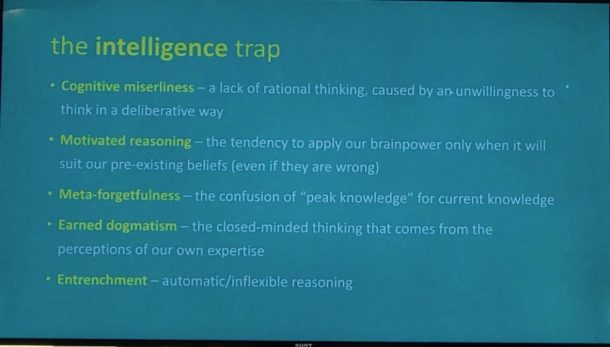David Robson – The Intelligence Trap at Henley Lit. Fest. 2019
 As a journalist with an interest in science David had worked for many of the quality broadsheets in the UK and US. He learnt a lot along the way and became curious about clever people who seem to make poor decisions. This led to him researching ‘The Intelligence Trap’ and the book offers his findings and suggestions. It is not just about pointing our finger at others but to recognise when and why we may make poor decisions.
As a journalist with an interest in science David had worked for many of the quality broadsheets in the UK and US. He learnt a lot along the way and became curious about clever people who seem to make poor decisions. This led to him researching ‘The Intelligence Trap’ and the book offers his findings and suggestions. It is not just about pointing our finger at others but to recognise when and why we may make poor decisions.
He shared the story of Paul Frampton, Professor of Physics at the University of North Carolina, who fell for a fake glamour model and this led to him being imprisoned for drug smuggling in South America. Then there was Kary Mullins, winner of the Nobel prize in Chemistry in 1993. Despite his science credentials he went on to deny truths in other fields such as psychology, in medicine around HIV and in environmental science concerning the impact of CFC’s on the ozone layer. He was however passionate about astrology and believed vitamin C could cure everything, including cancer.
Intelligence quotient (IQ) is one of the ways we measure intelligence and although it’s flawed it does predict performance in the current education system. (There were comments on emotional intelligence later in the discussion). One of the approaches taken by David is to wonder if having a high IQ could backfire? Does the quicker processing for a clever brain lead it just as quickly to the wrong answer as to the correct one? He gives a good analogy of a car where being fast is only helpful if the terrain, steering and brakes are working well.
David went on to identify three ways in which intelligent people can make less than clever decisions. Firstly, ‘The Cognitive Miser’ who believes he is always right, does not second guess his own opinion and struggles with cognitive biases. Secondly, Motivated Reasoning is the tendency to apply our brain power only when it will suit our pre-existing beliefs (even if they are wrong). He gave a fantastic example here of Sir Arthur Conan Doyle believing in fairies whilst not allowing for magic tricks, so much so that he lost his friendship with the illusionist Harry Houdini.
Thirdly, we have ‘The Curse of Expertise’. This is where we overestimate what we remember, feel we know it and become closed minded (earned dogmatism) and through automatic or intuitive reasoning we become entrenched in our views. I found this last point hard to write because although some are critical of experts the point, I think, is not to denigrate them but to encourage each of us to become more self-aware and explore our biases.
He goes on to list the serious consequences for our society if clever, and often powerful, people continue to fall into the intelligence trap. He links some of this to our fear and shame around being wrong. (This aspect reminds me of the work of the hugely popular and wholehearted social scientist researcher Brené Brown). Similarly, our schools and workplaces reward those who respond confidently and quickly – even though they may not be right. 
To avoid falling into the intelligence trap David has several suggestions. These include identifying our own biases, consulting our emotional compass and considering arguing the opposite viewpoint to see how that sits.
One of the things that came out in the question and answer time is that there appears to be a difference between men and women. The result is that mixed teams make fewer mistakes; providing more evidence for equality in the workplace. Some of the poor decisions are made when people are overconfident and believe their own hype. The audience recognised how difficult it would be for the lone dissenting voice in a team. The hope is that more sectors, particularly areas covering health and justice, become aware of how the intelligence trap plays out in their organisations and begin to take steps to mitigate it. Here’s hoping.
Shirley Anstis
@shirleyanstis on Twitter and Instagram
